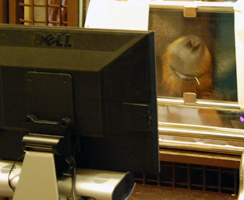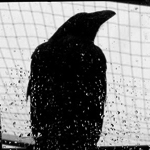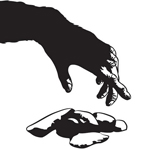The Cognitive Zoology Group
Cognitive Zoology
How did cognition evolve? When and where did specific forms of cognition evolve? Has it evolved in similar ways again and again?

These questions can be answered by looking beyond the single species and compare organisms with different, and similar, abilities in different, and similar, environments. In this way the histories of cognition can be reconstructed.
This means the careful study of what animals do, and how they do it. To answer the how question, detailed experimental studies are needed where underlying mechanisms can be traced.
The Cognitive Zoology Group directs two research stations for animal cognition studies: Lund University Corvid Cognition Station and Primate Research Station Furuvik. At these research stations, we collect data – often in various external collaborations.
We call our field cognitive zoology to reflect the fact that we believe that cognition is an integral part of all facets of animal life. It is not just a late-coming addition to behaviour, separable from this. Consequently, there must be a placement of cognition in a larger zoological context, that takes into consideration animals’ ethologies, ecologies and adaptations, as well as developmental and learning processes.
Furthermore, we call our research cognitive zoology to emphasise that we aim to be broader than traditional comparative animal research, not confined to the methods of e.g. experimental psychology. And although comparisons play an important role in our field, we are often as interested in cognition as part of the description of single species, or of individuals.
Projects
Read about our current and finished projects under the Projects tab.
Education
Want to join us?
Check out our course (external link to fil.lu.se): Animal Cognition – Djurkognition
NB. The course is given in Swedish.
People
Andrey Anikin, Mail: andrey.anikinlucs.luse, Phone: +46 (0)46 222 1748
Rasmus Arnling Bååth, Mail: rasmus.baathlucs.luse
Can Kabadayi, Mail: can.kabadayilucs.luse, Phone: +46 (0)46 222 0284
Elainie Madsen, Mail: elainie.madsen@gmail.com
Ivo Jacobs, Mail: ivo.jacobslucs.luse, Phone: +46 (0)46 222 0284
Helena Osvath, Mail: helena.osvathlucs.luse
Mathias Osvath, Mail: mathias.osvathlucs.luse, Phone: +46 (0)46 222 3299
Tomas Persson, Mail: tomas.perssonlucs.luse, Phone: +46 (0)46 222 0113
Stephan Alexander Reber, Mail: stephan_alexander.reberlucs.luse,
Phone: +46 (0)46 222 0284
Thomas Rejsenhus Jensen, Mail: thomas_rejsenhus.jensenlucs.luse,
Phone: +46 (0)46 222 0284
Gabriela-Alina Sauciuc, Mail: gabriela-alina.sauciuclucs.luse
Claudia Zeiträg, Mail: claudia.zeitraglucs.luse, , Phone: +46 (0)46 222 0284
Former members
Katarzyna Bobrowicz, Mail: katarzyna.bobrowiczpsy.luse
Megan Lambert, Affiliation: University of Veterinary Medicine, Vienna


